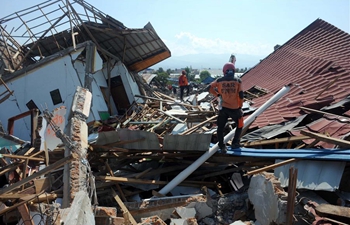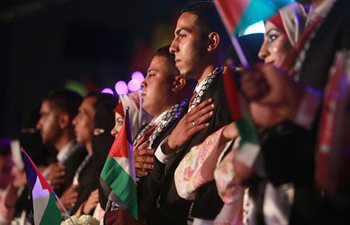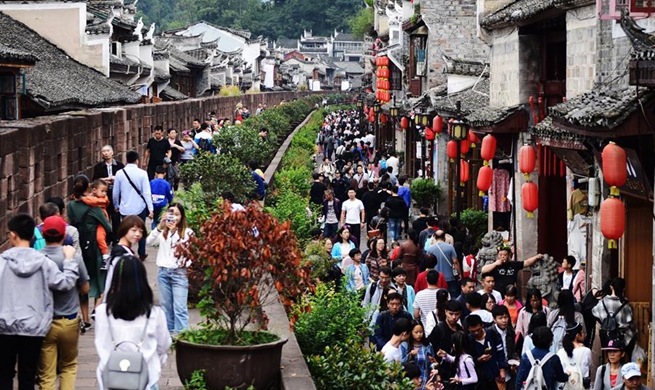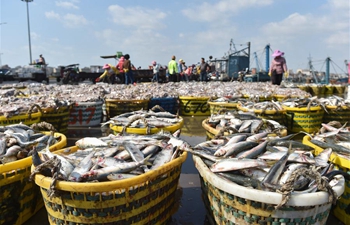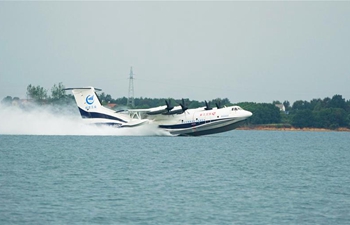WASHINGTON, Oct. 3 (Xinhua) -- The upcoming tour of U.S. Secretary of State Mike Pompeo to four Asian nations is aimed at building on the momentum of the denuclearization talks between Washington and Pyongyang and "put meat on the bare bones of the Singapore communique," experts said on Wednesday.
According to a statement released by State Department spokesperson Heather Nauert on Tuesday, Pompeo will travel to the capital cities of Japan, the Democratic People's Republic of Korea (DPRK), South Korea and China from Oct. 6-8. In Pyongyang on Oct. 7, he will meet with top DPRK leader Kim Jong Un.
"Throughout the Secretary's trip he will reiterate the Administration's continued focus on the final, fully verifiable, denuclearization of the DPRK, and longstanding commitment to our alliances and partnerships in the region," the statement said.
Earlier during a press briefing on Tuesday, Nauert said, "among the things that the secretary discussed were security assurances," noting "the secretary and the president said we're not going to set arbitrary deadlines in the interim. We're hopeful."
Dan Mahaffee, senior vice president and director of policy at the Center for the Study of the Presidency and Congress, told Xinhua that Pompeo's trip "is to continue momentum surrounding nuclear disarmament and to determine what the gaps are between North Korea and the United States when it comes to understanding just what the desired end state is."
"It is interesting to see what security guarantees, economic inducements, and diplomatic offers they (the DPRK) seek from the U.S. and South Korean governments to keep this process moving," he said. "I think there is momentum towards a treaty to end the war, yet differing visions for what the peace treaty would mean in terms of the close cooperation and alliance structure between the United States and South Korea."
However, Brookings Institution Senior Fellow Michael O'Hanlon told Xinhua that "the core challenge being to agree at least in broad terms on at least the first part of a nuclear deal that would halt production of more bombs promptly. Without that, everything else is hard, maybe too hard."
Douglas Paal, vice president for studies at the Carnegie Endowment for International Peace, said, "indications are the U.S. wants measurable progress toward denuclearization and the North wants an end to the state of war, but the North's media rejects these as trade-offs, and wants its demand for an end to the armistice first."
"Pompeo's credibility is very much on the line if he cannot show progress on something directly related to the North nuclear and missile capabilities. Presumably his meeting with Foreign Minister Ri (Yong Ho) gave him some indication this trip would not be a waste of time," the expert pointed out. "A peace treaty is a long way away, and would require other actors, such as Seoul and Beijing."
A senior research fellow for Northeast Asia at the Heritage Foundation Bruce Klingner said, "Pompeo is hoping to put meat on the bare bones of the Singapore communique by getting Pyongyang to accept the UN-mandated denuclearization of its arsenal."
"There does not seem to have been any behind-the-scenes progress or success, so the situation has not actually changed from when Pompeo's August trip was cancelled," he said.
"Pompeo should condition a second U.S.-North Korean summit on viable progress on a denuclearization accord far stronger than the Singapore communique. The concern is that his visit is simply to deal with logistics for another ill-prepared summit based more on theatrics than substance," he added.
Saying that there are significant reasons arguing against the United States signing a peace declaration, Klingner said Trump may be tempted by the seeming historic aspect of doing so.
Overall, the "Trump administration now faces the dilemma of enforcing principles and risking strained relations with Seoul, or boarding the euphoric peace train," he said.
"Trump seems pulled in both directions. He has expressed both unrealistic claims of what the Singapore summit accomplished, as well as subsequent disappointment in the lack of tangible progress. It would be premature to again rush into another summit meeting without sufficient planning," said the expert.
Last month, the State Department said Pompeo will travel to Pyongyang to discuss a second summit meeting between the leaders of two sides. Analysts said Pompeo is also tasked to lay the groundwork for Trump's second meeting with Kim.
Pompeo said on Wednesday that he is optimistic that the upcoming talks with the DPRK will have better understandings and deeper progress.
Speaking at a press briefing, Pompeo aid "I'm very happy to be going back to get another chance to continue to advance the commitment that Chairman Kim and President Trump made back in Singapore."
The DPRK on Saturday demanded the United States take steps to secure Pyongyang's trust before its denuclearization.
"Without any trust in the U.S. there will be no confidence in our national security and under such circumstances there is no way we will unilaterally disarm ourselves first," DPRK's Foreign Minister Ri Yong Ho told the UN General Assembly.
The key to consolidating peace and security on the Korean Peninsula is to thoroughly implement the joint statement adopted at the historic summit between Kim and Trump in Singapore in June, said Ri.
Speaking of Pompeo's stay in Tokyo, Mahaffee said "Tokyo is the most concerned about how the rapprochement between the United States and North Korea affects the trilateral security relationship between the U.S., South Korea, and Japan -- and the threat posed by North Korea."
"Japan had been a strong advocate of increased pressure on North Korea, but may feel a little 'left out of the loop' as Trump and (South Korean President) Moon (Jae-in) suddenly changed course," he explained. "Japan does not see the threat from North Korea diminishing, and therefore may be feeling the need to improve its own security capabilities, as well as coordination with the U.S. government on these issues."
Paal, of the Carnegie Endowment for International Peace, said, "Japan still harbors concerns that Trump may lower the bar too far for Pyongyang at the expense of Japanese security. Seoul is less concerned."
